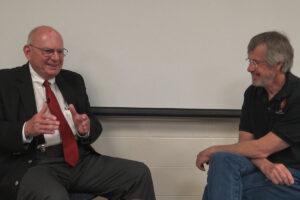Topic: Local Enhanced Management Area (LEMA)

Interview of Lon Frahm, June 18, 2020
Interviewed by Rex Buchanan
In this 2020 oral history interview, Lon Frahm describes his involvement in groundwater policy development as a member of Northwest Groundwater Management District No. 4. During the 1990s, he challenged the zero-depletion policy (to take only the amount of water that will be naturally replenished). Frahm supported local control of water management. He observed that over the years control over water planning has shifted to state-level water agencies, particularly the Kansas Water Office, that are not “invested personally” in managing water in northwest Kansas. In his view, state Water Plan funding has resulted in spending that Show Moredoes not help farmers and other local interests. Frahm cites the importance of local culture in setting water policy using as an example the Local Enhanced Management District (LEMA) in Sheridan County. He notes that the success of that endeavor grew out of the shared values of the farmers and a local market for grain. Frahm argues that changes in water use will be very slow over time, and water use should not be held back because we cannot predict the future. Show Less

Interview of Joe Harkins, April 24, 2019
Interviewed by Rex Buchanan
In 2019 Joe Harkins sat down for an oral history interview conducted by Rex Buchanan. Harkins describes a career that began in public health and ranged from addressing nursing home problems in Kansas to initiating a graduate program in health administration. Persuaded to take on running the Kansas Water Office, Harkins engaged in transforming the culture of water administration at a time when issues related to water had a high priority in the state. In a detailed discussion of water policy, he discussed the dynamics of the relationship between governors and the legislature in developing, adopting, and funding Show Morea state water plan in the 1980s and early 1990s. Harkins brings the perspective of a professional public administrator to the issue of water policy development. He recalls learning about water policy while he was in charge of developing it. Harkins also has the perspective of a key staff member in several administrations in which water policy was a high priority. He reflects on the importance of gubernatorial leadership and the power dynamics among the various interests that shaped the ultimate policy. Harkins laments that water issues are no longer among the highest priorities in state public policy administration. This interview provides the most comprehensive explanations of policy development in practice in Kansas state government that is available.
Highlights -- short excerpts from the interview
